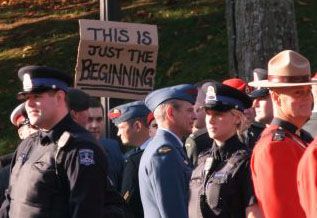One of the first speakers at the Occupy Nova Scotia rally in Parade Square last night had a lot of people to thank. "Thank you everyone for braving the rain, thank you for the people who are staying here, thank you to those who are making food, building tents, and for just everything. This is amazing. Thank you," exclaimed Wilf on day five of of a protest that has seen dozens of people camping in downtown Halifax.
But it was the police that Wilf singled out for praise. "The main reason I'm here is to thank someone very important, and that is the police," he said, to which many in the crowd of supporters responded with cheers and clapping. "The reason I'm saying that is first of all, we're still here aren't we?"
This praise did not sit well with Mi'kmaq elder Billy Lewis, who spoke later in the evening. "To consider [the police] our friends and allies, that'd be a mistake," he said in an interview.
In his speech, Lewis, a supporter of Occupy NS, addressed the thank-you to police and the blanket positivity some of the speakers were using to describe the Occupy Movement, a movement that started in Wall Street and has spread around the world.
"There's a tendency to want to keep positive," said Lewis. "But I'm sorry folks, if someone is screwing you around and your'e not yelling, you're doing something wrong." Lewis used to work on the Downtown Eastside in Vancouver, an area where many Aboriginal women have gone missing or been murdered. "Many of my friends are now dead [because of] the people we just praised not doing their jobs."
The police exist "to protect the one per cent," writes Harsha Walia in a letter to a movement whose chant "We are the ninety-nine per cent" can now be heard at rallies across North America. In A Letter to Occupy Together Movement, Walia, a Vancouver-based activist and writer, criticizes Occupy organizers who have actively cooperated with police. "The police have a long history of repression of social movements," she writes. "Marginalized people, such as those who are homeless, Indigenous, youth of colour, non-status, and trans people also routinely experience police abuse and do not feel that the police serve and protect their interests."
Indeed, says Lewis, "The idea of the ninety-nine per cent homogenizes the ninety-nine, as if we're all coming from the same place and on the same side."
"Some of that ninety-nine per cent are working for the other side," said Lewis in his speech, and he puts the police in that category.
"The whole system is geared to enforcing the hierarchical or corporate model," says Lewis, and the police are a part of that model. "Even if someone lower down on the chain gives us an assurance [of safety] that doesn't matter when someone higher up gives an order." Once that happens, says Lewis, "They won't be our allies or our friends."
Tom Smith, who doesn't want to give his real name because he's "afraid of the police" is part of Occupy Nova Scotia and has been camping out in Parade Square for several nights. He acknowledges that, so far, officers have been friendly, but has seen police in Halifax act very differently towards protestors at demonstrations in the past. During a march against the G8 development ministers meeting in the spring of 2010, for example, he witnessed mounted police use their horses to push protesters back, a move he says threatened the safety of those participating in the march.
Smith says that so far, the occupation has done little to disturb business as usual in downtown Halifax. The police "will quickly intervene if we disturb business as usual," he says.
"I think it's naive to think the powers that be will give up what they have without a fight," says Smith. "And I don't think the people here are ready for that."
Despite his concerns, Smith believes something amazing is happening in Parade Square. "I'm working really hard to keep this place going, cause I have a lot of hope in it," he says. "People are talking in groups about issues that are important."
"I am enjoying this extremely peaceful moment of this global movement," says Smith. "We're building something right now." For Smith, an exciting part of the movement is about people taking their own power back, and taking control of their own lives.
The notion of autonomy is one echoed in Walia's writing. "We must also learn to rely on ourselves, not the police, to keep ourselves safe and to hold ground when they are ordered to clear us out."



